Key takeaways:
- Recovery drinks enhance post-exercise nutrition by aiding muscle recovery, replenishing nutrients, and improving hydration.
- Timing, taste, and ingredient balance are crucial factors in choosing an effective recovery drink for optimal benefits.
- Establishing a routine around recovery drinks promotes a positive mindset and reinforces the recovery process.
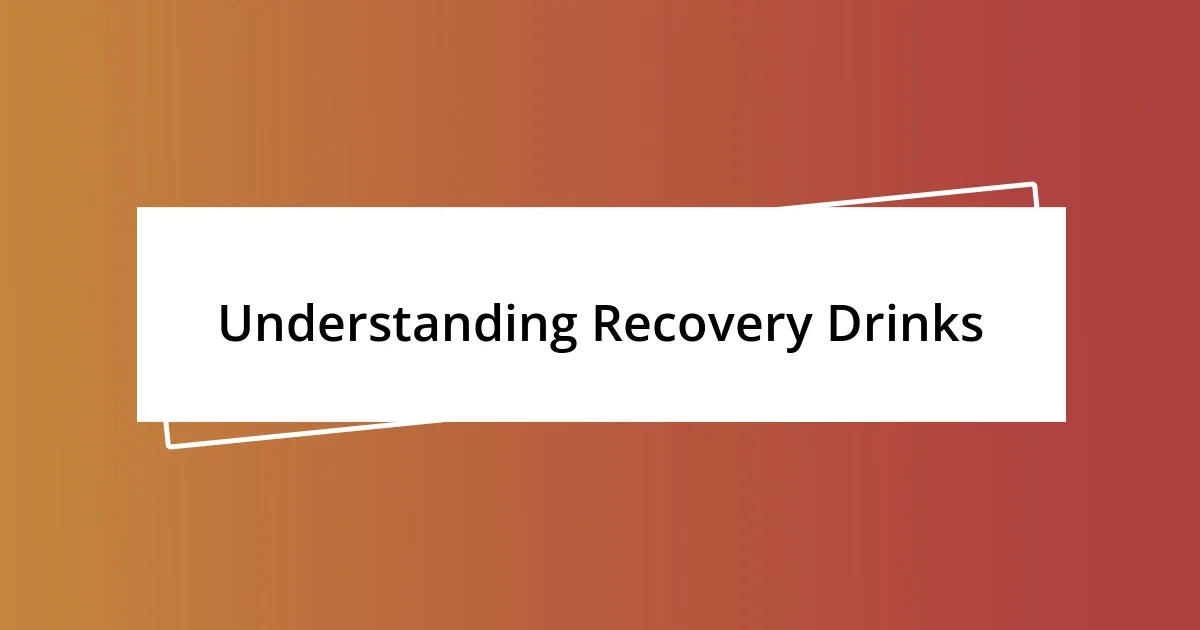
Understanding Recovery Drinks
Recovery drinks play a crucial role in post-exercise nutrition, aiding in muscle recovery and replenishing lost nutrients. I remember the first time I tried a popular recovery drink after an intense marathon training session. I was surprised by how quickly it made me feel revitalized, turning what typically felt like a sluggish recovery into a more energetic experience.
What I found fascinating is how each recovery drink is formulated differently, targeting specific needs. After my workouts, I often pondered which ingredients truly made a difference. I’ve experimented with several—some packed with protein, others focused on electrolytes—and observed how they affected my recovery time and overall energy levels. Have you ever wondered why some drinks seem to work better for you than others?
One thing I learned is that the timing of consuming a recovery drink can significantly impact its effectiveness. I’ve noticed that downing one within 30 minutes post-workout consistently leaves me feeling stronger. It’s like having a special secret weapon in my hydration arsenal that helps me bounce back faster, ready for the next challenge. It’s a game-changer!
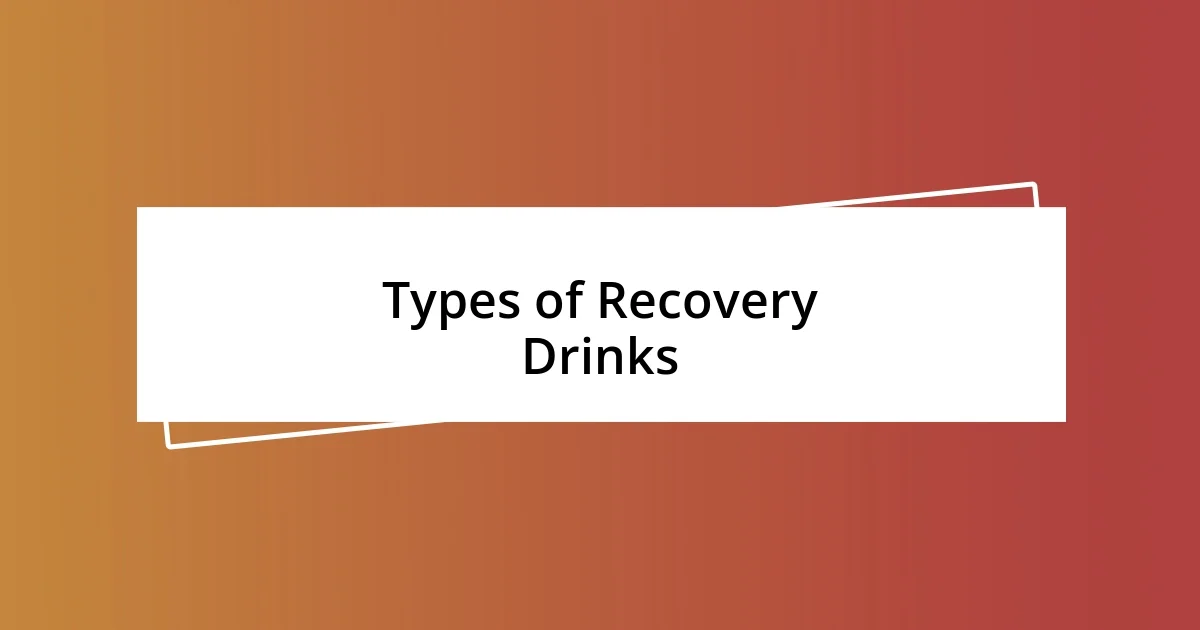
Types of Recovery Drinks
When it comes to recovery drinks, I’ve encountered a delightful variety that caters to different preferences and needs. Whether you’re a casual gym-goer or a seasoned athlete, there’s something on the market for everyone. For instance, I used to reach for a simple carbohydrate drink after long runs, which really helped replenish my lost energy. Over time, I’ve gravitated toward protein-rich options, especially after weightlifting sessions. I find that this helps repair muscle tissue and keeps me feeling fuller longer.
Here are some common types of recovery drinks I’ve tried and enjoyed:
- Protein Shakes: Usually packed with whey or plant-based protein, these are my go-to for muscle recovery.
- Electrolyte Drinks: Perfect for rehydrating after sweaty cardio sessions; I love the zesty lemon-lime flavor!
- Coconut Water: A natural option that provides hydration and essential nutrients; it has a refreshing taste that I appreciate on hot days.
- Chocolate Milk: Surprisingly effective! It’s a combination of carbs and protein, making it a delicious recovery alternative.
- Smoothies: I like to blend fruits with yogurt or protein powder, giving me a tailored recovery drink that’s colorful and tasty.
Every drink has its unique sensation, and I enjoy experimenting with them all to see which combination provides the best post-workout revival.
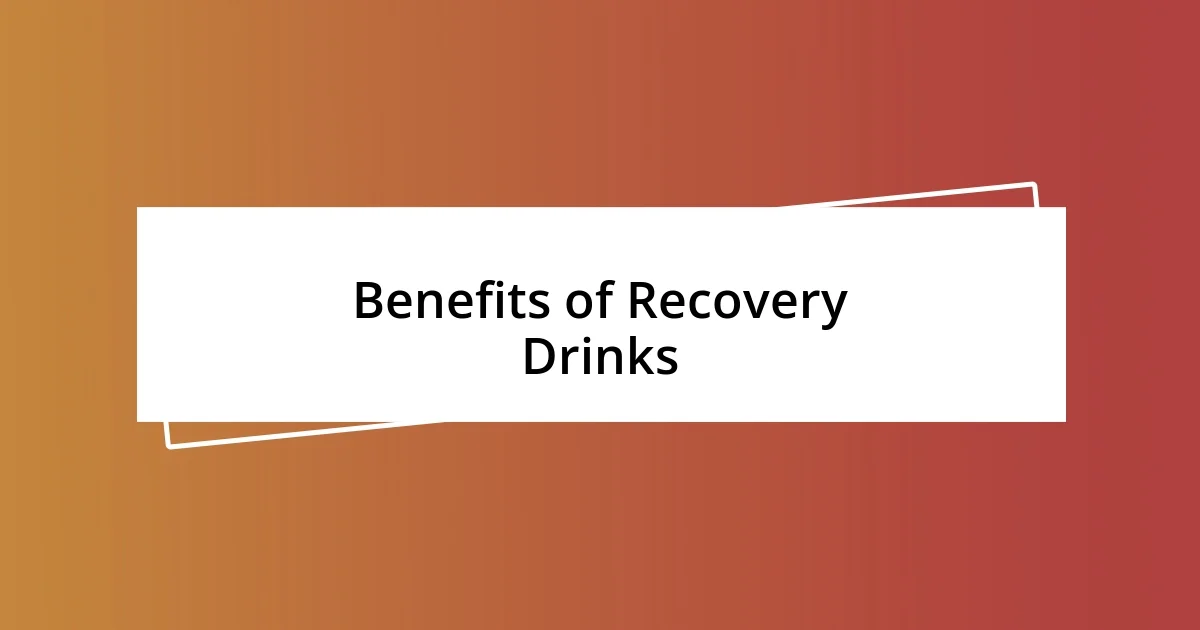
Benefits of Recovery Drinks
Recovery drinks significantly enhance muscle recovery by providing the essential nutrients your body craves after a workout. After I started using recovery drinks religiously, I noticed that my soreness decreased dramatically. It felt as though I had a safety net, cushioning me from the uncomfortable aftermath of intense exercises. This support encouraged me to push my limits further, knowing I had something aiding my recovery.
Another benefit is hydration, which can’t be overstated. I remember one sweaty summer afternoon after a long jog; the feeling of rehydrating with an electrolyte-rich drink was invigorating! It’s fascinating how quickly these beverages can rehydrate you. Instead of feeling parched and fatigued, I felt revitalized, ready to tackle whatever came next on my agenda. This immediate response hasn’t just improved my workouts; it shifted my entire approach to physical activity.
What truly amazed me was the mental side of recovery drinks. I’ve often found that consuming one after a workout acts as both physical and psychological reassurance. It’s like having a little ritual that tells my body it’s okay to relax and recuperate. That tiny moment of enjoyment in sipping a recovery drink feels almost like a reward after a tough session, reinforcing my commitment to my fitness goals.
| Benefits | Personal Experience |
|---|---|
| Enhanced Muscle Recovery | Less soreness and quicker recovery times allowed me to maintain my workout routine. |
| Improved Hydration | Feeling revitalized after rehydrating with electrolyte drinks made workouts more pleasant. |
| Mental Boost | Engaging in a post-workout drink became a personal ritual that motivated me to stay on track. |

My Personal Experience
My journey with recovery drinks has been pretty eye-opening. I still remember the first time I tried a protein shake after a grueling workout. It was almost like my body was thanking me for replenishing what it had lost. The velvety texture and sweet flavor felt like a treat, turning the routine of recovery into something enjoyable rather than just a chore.
There was a moment during a particularly hot summer when I finished an intense cycling session. I reached for my favorite electrolyte drink, and I can still feel the rush of relief as it hit my lips. The coolness and zest of the flavor seemed to wash away not just the thirst but also the fatigue that clung to my limbs. It made me wonder—how is it that something so simple can feel so rejuvenating? That experience transformed my view on hydration; it became less about necessity and more about self-care.
Late one night after pushing myself during a tough gym session, I found solace in a chocolate milk recovery drink. As I sipped it, it struck me—it wasn’t just about muscle replenishment; it was about indulgence, too. The creamy sweetness reminded me of childhood treats, and I couldn’t help but smile at how something so nostalgic could support my fitness goals. Have you ever had a drink that made you feel like you were treating yourself? That emotional connection helped solidify recovery drinks as a staple in my routine.
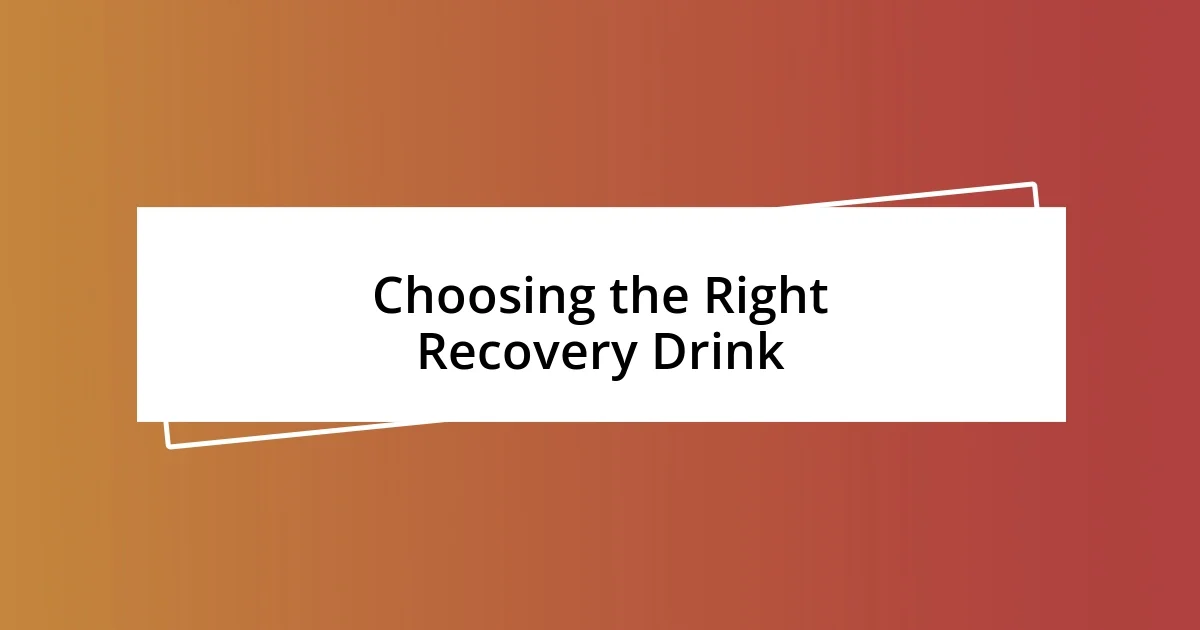
Choosing the Right Recovery Drink
Choosing the right recovery drink can feel overwhelming, especially with so many options available. When I first started this journey, I felt compelled to try every trendy drink on the market, hoping to find a magic potion for recovery. However, I soon realized that what works for one person might not work for another. I found that sticking to drinks with a balanced combination of carbohydrates, protein, and electrolytes was ideal for me. Have you ever considered how your individual needs might shape your choice?
Taste plays a surprisingly significant role in my decision-making process. I remember trying a drink that was highly recommended but tasted like chalk. It totally ruined my post-workout vibe! From that experience, I learned to prioritize flavor alongside nutrition. Now, if a recovery drink doesn’t taste good, I simply won’t enjoy it as much, and it dampens the entire recovery experience. Do you agree that if you don’t look forward to a drink, it can feel more like a chore than a treat?
I also believe that the timing of consumption is essential. Drinking my chosen beverage within 30 minutes post-workout seems to maximize its effectiveness. The other day, after a challenging strength-training session, I sipped on a mango-flavored recovery drink. The timing and the flavor combined felt just right, and I could almost feel my muscles thanking me for the timely nourishment. Have you tried syncing your recovery drink with your workout? It’s a small tweak that truly pays off!
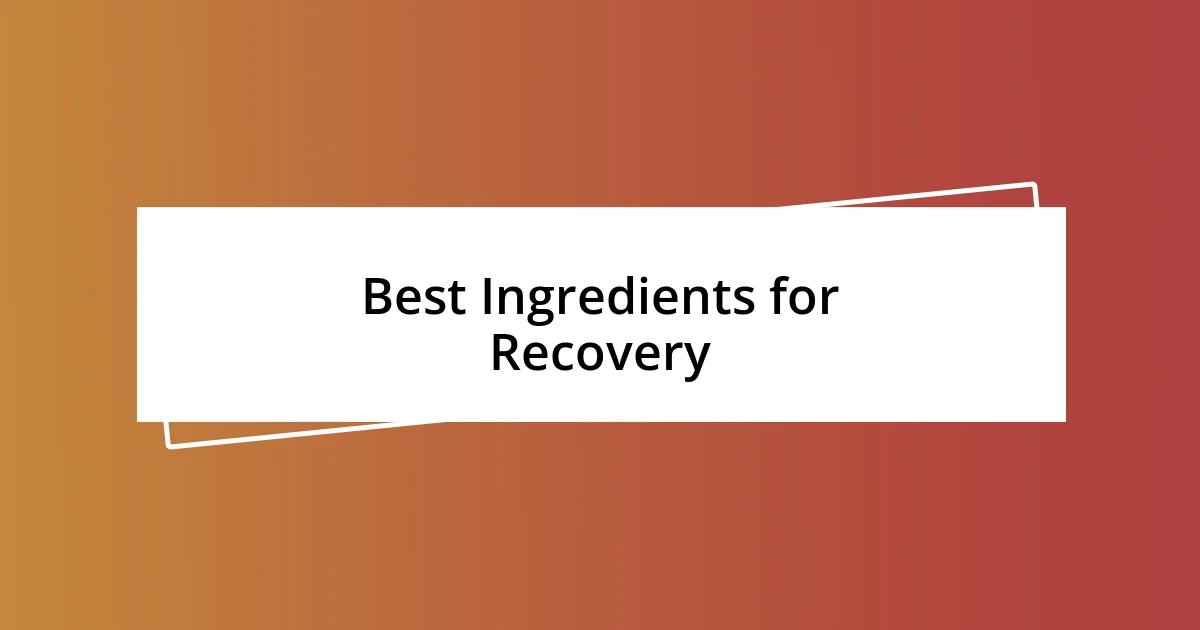
Best Ingredients for Recovery
When it comes to the best ingredients for recovery, I’ve found that the right balance can make a world of difference. Lean proteins, like whey or plant-based options, play a crucial role in muscle repair. I remember a time when I incorporated a pea protein shake into my routine right after a marathon. The way my muscles felt less sore the next day was a real eye-opener. Have you ever experienced that sense of immediate relief from a specific ingredient?
Carbohydrates are another essential player in the recovery game. I used to overlook them, thinking they weren’t necessary post-exercise. However, I discovered that pairing my protein with a source of complex carbohydrates, like oatmeal or a banana, gave me sustained energy. It was like discovering a secret formula: the carbs replenished my glycogen stores, while the protein did its magic on my muscles. Does that make you rethink what you include in your recovery drinks?
Lastly, I can’t stress enough the importance of electrolytes. After a tough workout, sipping on a beverage enriched with sodium and potassium feels restorative in such a vibrant way. I recall finishing a hot yoga session and clutching a coconut water-based drink; the refreshing taste brought me back to life. It wasn’t just about hydration; it felt like revitalization. Have you found that some flavors bring a special kind of energy to your recovery?
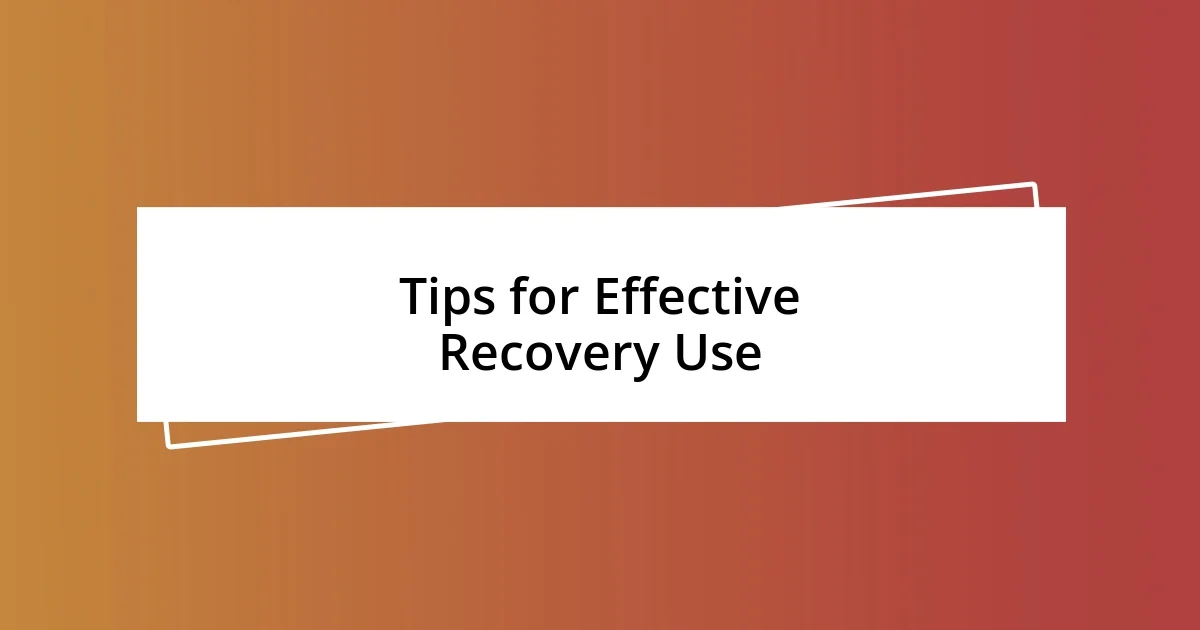
Tips for Effective Recovery Use
When using recovery drinks, I’ve learned that moderation is key. In my early days of experimenting, I went overboard with different flavors and brands, which led to an upset stomach on more than one occasion. It made me realize that sometimes less truly is more. Have you ever found yourself consuming too much of a good thing?
I also recommend paying attention to the ingredients list. There was a time when I was drawn to a brightly colored label that showcased impressive marketing claims. However, after a few sips, I noticed my energy dipping instead of surging. It turns out, the drink was loaded with sugars and artificial additives. Now, I always aim for transparency—I look for natural ingredients that I can recognize. How do you feel when you read the label of your recovery drink?
Embracing a routine around recovery drinks has also benefited me immensely. I designate specific post-workout rituals—like unwinding with my recovery drink while stretching or journaling about my session. This practice not only enhances my enjoyment of the drink but also helps me mentally connect it to the process of recovery. Have you created a routine that makes your recovery feel more intentional? Establishing such habits can create a positive mindset surrounding your recovery journey.














